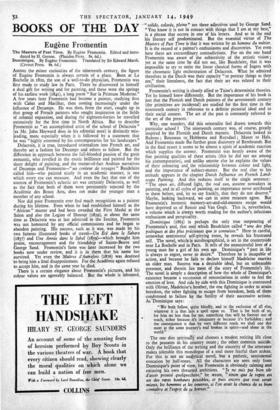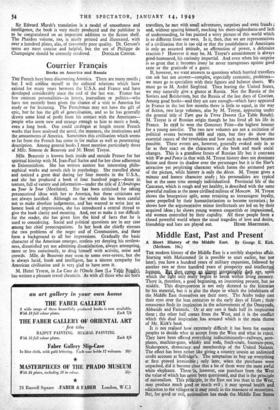BOOKS OF THE DAY
Eugene Fromentin
The Masters of Past Time. By Eugene Fromentin. Edited and intro- duced by H. Gerson. (Phaidon Press. 8s. 6d.) Dominique, By Eugene Fromentin. Translated by Sir Edward Marsh. (Cresset Press. 9s. 6d.) AMONG the minor curiosities of the nineteenth century, the figure of Eugene Fromentin is always certain of a place. Born at La Rochelle in 1820, the son of a well-to-do physician, Fromentin was first made to study law in Paris. There he discovered in himself a dual gift for writing and for painting, and these were the springs of his earliest work (1841), a long poem " Sur la Peinture Moderne." A few years later Fromentin had become a painter, studying first with Cabat and Marilhat, then coming increasingly under the influence of Decamps. He was then, from the start, caught up in that group of French painters who sought inspiration in the fields of colonial expansion, and during the eighteen-forties he travelled extensively for the first time in North Africa. But to describe Fromentin as "an accomplished artist of the school of Delacroix" (as Mr. John Hayward does in his editorial note) is distinctly mis- leading, more especially when it is followed by a statement that he was "highly esteemed by his contemporaries for his landscapes."
Delacroix, it is true, introduced orientalism into French art, and thereby set a fashion for Decamps and others to follow. But the difference in approach between the full-blooded passion of the great romantic, who revelled in the exotic brilliance and painted for the sheer delight of painting, and the matter-of-fact Arabian narratives of Decamps and Fromentin—"un conteur de voyages" Baudelaire called him—who painted nicely in an academic manner, is one which every eye can measure. And even the fact that one of the sources of Fromentin's eclectic art was certainly Delacroix, as well as the fact that both of them were persistently rejected by the Academie des Beaux Arts, does not make the younger man a member of any school.
Nor did poor Fromentin ever find much recognition as a painter during his lifetime. Even when he had established himself as the " African " master and had been awarded the First Medal at the Salon and also the Legion of Honour (1859), at about the same time as Delacroix was at last admitted to the Institut, Fromentin was not honoured by any official commissions and he began to abandon painting. His success, such as it was, was made by his two famous illustrated books of travel—Un Ete dans le Sahara (1857) and Une Annee dans le Sahel (1859)—which brought him praise, encouragement and the friendship of Sainte-Beuve and George Sand. Fromentin's fame was later increased by the two books now under review, and it is in them that his name has survived. Yet even the Maitres d'Autrefois (1876) was destined to bring him a final disappointment. For the Academie again refused to. accept him, and in the same year he died.
There is a certain elegance about Fromentin's pictures, and his colour values are agreeably balanced. But the whole is laboured,
"solide, color*, pleine" are three adjectives used by George Sand. " You know it is not in contact with things that I am at my best," is a phrase that occurs in one of his letters. And so in the end his literary self predominated. But the essential virtue of The Masters of Past Time is that it was written by an homme du métier. It is the record of a painter's enthusiasms and discoveries. Yet even here there are extraordinary contradictions. For on the one hand Fromentin was aware of the subjectivity of the artistic vision ; yet at the same time he did not see, like Baudelaire, that it was impossible to try to unite the linear classical forms of Ingres with the chromatic light orchestration of Delacroix. What he admired therefore in the Dutch was their capacity " to portray things as they are," their literalness, the fact that their art was related to their civilisation.
Fromentin's writing is closely allied to Taine's determinist theories. Yet he himself knew differently. But the importance of his book is just that the Flemish and Dutch painters of the seventeenth century (the primitives are incidental) are studied for the first time in the nineteenth century in reference to a definite pictorial ideal and to their social context. The art of the past is constantly referred to the art of the present.
Why, one wonders, did this orientalist feel drawn towards this particular school ? The nineteenth century was, of course, greatly inspired by the Flemish and Dutch masters. Delacroix looked to Rubens ; Rousseau to Hobbema and Ruysdael ; Manet to Hals. And Fromentin made the further great discovery of Rembrandt. But in the final resort it seems to be almost a spirit of academic reaction which supplies the answer. Fromentin was keenly aware of the fine painting qualities of these artists (this he did not see among his contemporaries), and unlike anyone else he explains the values of their colouring and the relationship between colour and light, and the importance of subject-matter. But the real clue to his attitude appears in the chapter Dutch Influence on French Land- scape Painting. And this reduces itself to the single sentence: " The open air, diffused light, the real sun, assume nowadays in painting, and in all styles of painting, an importance never attributed to them before, and, let us say frankly, that they do not deserve." Maybe, looking backward, we can in some measure agree. But Fromentin's hermetic memory-art-and-old-masters recipe would have deprived us of Renoir and Van Gogh. This is, nevertheless, a volume which is always worth reading for the author's infectious enthusiasm and perspicacity.
Dominique (1863) is perhaps the only true outpouring of Fromentin's soul, that soul which Baudelaire called " une des plus poetiques et des plus precieuses que je connaisse." Here in careful, somewhat sentimental self-pitying tones, he reveals his frustrated self. The novel, which is autobiographical, is set in the countryside near La Rochelle and in Paris. It tells of the unsuccessful love of a young man for a girl of his own age. Dominique's " part in life is always to regret, never to desire." Therefore he is incapable of action, and because he fails to declare himself Madeleine marries an older man. Success was a desirable ideal, but an unbearable presence, and therein lies most of the story of Fromentin's life. The novel is simply a description of how the whole of Dominique's existence became a succession of renunciations in order to feel the emotion of love. And side by side with this Dominique is contrasted with Olivier, Madeleine's brother, the one fighting in order to attain boredom, the other fighting to escape from boredom, both of them condemned to failure by the futility of their successive actions. As 'Dominique says: "We both follow, quite blindly, and to the exclusion of all else, whatever it is that lays a spell upon us. That is for both of us, for him no less than for me, something that will be forever out of reach, either because it's imaginary or because it's forbidden ; and the consequence is that by very different roads we shall one day meet at the same journey's end broken in spirit—and alone in the world."
The one dies spiritually and chooses a modest retiring life close to the peasants in his country estate; the other commits suicide. Only the brilliance of the writing and the sincerity of the utterance makes tolerable This monologue of a soul more fearful than ardent. For this is not an analytical novel, but a pathetic, sentimental evocation by half-tones. All the characters are seen only from Dominique's point of view, for Fromentin is obviously calming and excusing his own thwarted ambitions. " ne suis pas bien stir d'avoir prouve quelquechose," he wrote, "sinon que le repos est un des rares bonheurs possibles, et puis encore que tout serail mieux, les hommes et les oeuvres, si l'on avait la chance de se bier connaitre et l'esprit de se borner."
Sir Edward Marsh's translation is a model of smoothness and intelligence, the book is very nicely produced and the publisher is to be congratulated on an important addition to the fiction shelf. The Phaidon volume, too, is nicely printed and illustrated, with over a hundred plates, alas, of tiresomely poor quality. Dr. Gerson's notes are most concise and helpful, but the sex of Philippe de
Champaign should be correctly rendered. DOUGLAS COOPER.



































 Previous page
Previous page